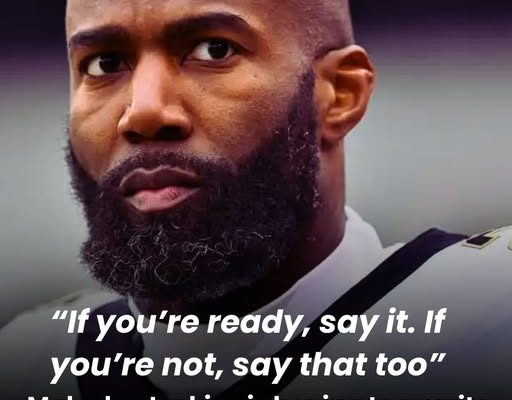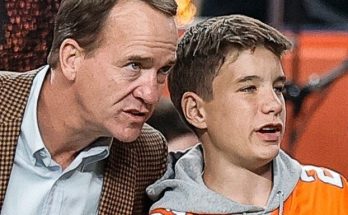For most professional athletes, the end of a playing career brings closure—a sense of finality that shifts the focus to post-football pursuits, broadcasting gigs, business ventures, or simply time with family. But for Malcolm Jenkins, the former New Orleans Saints and Philadelphia Eagles safety, that door doesn’t feel fully closed. Not because he’s clinging to glory days or seeking the spotlight, but because he still feels the fire inside. He’s not looking for a ceremonial role, a coaching title, or even a symbolic one-day contract to retire as a member of the team he once led. Jenkins wants to play. To put on the pads, the helmet, and run back onto the field as if time hasn’t passed. And for a man who gave so much to the sport, especially to the Eagles organization, his yearning says more than stats, accolades, or highlight reels ever could.
Jenkins is 36 years old. That’s not young in football years, especially for a position that demands as much physicality and speed as safety. But Jenkins has always defied the odds. Drafted 14th overall by the Saints in 2009, he transitioned from cornerback to safety, redefined versatility in the defensive backfield, and built a career on intelligence, leadership, and relentless durability. From the Super Bowl with the Saints to the championship parade in Philadelphia, Jenkins never missed a beat. He started 137 consecutive regular season games at one point—more than a testament to physical health, it was an illustration of his football mind, his preparation, and the trust every coach he played for had in him.
So when Jenkins openly expressed a desire to return—not for ceremony, not for honor, but to actually suit up—it wasn’t dismissed by fans or pundits as wistful retirement talk. It hit differently. Because Jenkins doesn’t traffic in nostalgia. He’s a realist, a thinker, and perhaps most importantly, a man who’s never lost his sense of purpose. And right now, that purpose is pulling him back to the field, specifically toward the Philadelphia Eagles, a franchise he helped shape in culture and character.
Why now? Why come back when he’s already walked away? That’s the question echoing around the NFL, but for Jenkins, it isn’t as complicated as it seems. The answer, by his own admission, lies not in ego but in service. He sees a team that’s poised to win, that has talent across the board, but also one that could use leadership on the field, especially in the secondary. And Jenkins isn’t implying the Eagles are in disarray—they’re contenders. But he knows what it takes to win in Philadelphia. He knows what it means to wear the green and white when the stakes are highest. That kind of presence, he believes, can still make a difference.
Jenkins’ last season came in 2021 with the Saints, and while he wasn’t the dominant playmaker of his younger years, he remained effective, logging 79 tackles, 1.5 sacks, and an interception in 16 games. He wasn’t just filling space—he was still reading quarterbacks, sniffing out screens, and calling out formations before they even unfolded. Few safeties in NFL history have had his combination of range, intelligence, and durability. And even fewer could claim the respect he commands from locker rooms across the league.
But respect isn’t what Jenkins is after. He already has that in abundance. What he misses, and what he’s now seeking, is the rhythm of Sunday competition—the chess match against offensive coordinators, the sideline adjustments, the roar of the crowd after a third-down stop. For someone like Jenkins, the game was never just about personal accolades. It was about impact. Impact on the scoreboard, in the locker room, in the community. His work off the field—through his Malcolm Jenkins Foundation and activism on social justice—has already cemented his legacy. But in his mind, that doesn’t mean the on-field chapter is finished.
The Eagles know Jenkins well. They know what he meant during his six years with the team, including the magical 2017 Super Bowl run. He was more than a Pro Bowl-caliber safety. He was the defensive heart of the team. When a locker room needed centering, Jenkins was the voice. When a young cornerback needed guidance, he was the mentor. And when the defense needed a tone-setter, Jenkins delivered—again and again.
Today’s Eagles secondary is rich with youth and speed, but also evolving. Darius Slay, a veteran himself, is still performing at a high level, but there’s a new generation coming in—players like Sydney Brown, Kelee Ringo, and other young DBs who grew up watching Jenkins control the backend of the defense like a quarterback in cleats. His return wouldn’t just bring snaps and tackles. It would bring mentorship, poise, and experience you simply can’t simulate.
But this isn’t about a nostalgia tour. Jenkins isn’t lobbying for a final ride. He wants to contribute meaningfully. That distinction matters. He’s not looking for ceremonial snaps or farewell tributes. He wants to play because he believes he still can, and because he sees a real need where he could fit. And he’s not wrong.
The safety position in today’s NFL is more complex than ever—players have to be part-linebacker, part-corner, part-coach on the field. That’s exactly the kind of hybrid role Jenkins flourished in. In fact, the modern “star” position—slot defender who can cover tight ends, tackle runners, and blitz—was practically invented for players like Jenkins. His football IQ allowed him to thrive even when his athleticism began to fade. And that’s the key to understanding his potential return. He doesn’t need to run a 4.3 anymore. He just needs to be in the right place at the right time, which he always has been.
Of course, questions remain. Can his body handle another NFL season? Would a team risk a roster spot on a 36-year-old safety? What does a return mean for the younger players trying to earn their keep? These are valid concerns, and Jenkins knows it. He isn’t asking for charity. He’s not demanding a contract. He’s simply making his availability known, in case the right situation emerges—especially if that situation is in Philadelphia.
And if the Eagles were to make the call, there’s little doubt Jenkins would be ready. He stays in elite shape. He still breaks down film like a player preparing for a game. His mind never left the field. It was just waiting for the body to follow. And in a league where availability is often the greatest ability, Jenkins presents a rare case: a player who’s walked away healthy, stayed sharp, and is now knocking gently—not forcefully—on the door again.
Would it be a fairytale ending? Maybe. But Jenkins has never been one for fiction. His return would be a calculated, purpose-driven comeback. Not to rewrite history, but to add one more page to it. One more season, one more voice in the locker room, one more chance to suit up for the city that embraced him as one of its own.
And perhaps that’s why this story resonates. Because it’s not about ego. It’s not about numbers or awards. It’s about identity. Jenkins doesn’t just want to return to football. He wants to return to the right football—Philadelphia football. The kind that bleeds effort and thrives in adversity. The kind that defines careers not by how they start, but by how they end.
If the Eagles decide to bring Jenkins back, even in a depth role, it will be more than symbolic. It will be about culture. Continuity. Leadership. And it will send a message that in a league obsessed with youth and metrics, there’s still a place for soul, for wisdom, for those who know what it takes to win—not just on the field, but in the locker room, in the weight room, and in the minds of teammates.
Jenkins isn’t asking for anything. Not money. Not guarantees. Just the chance to compete. And in today’s NFL, that kind of humility wrapped in fire is rare. If he gets the call, don’t expect a comeback tour. Expect hits. Expect film study. Expect results. Because when Malcolm Jenkins says he wants back in, it’s not for attention. It’s because, in his heart, he knows he still belongs.



